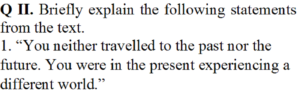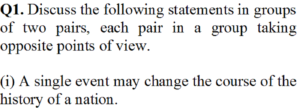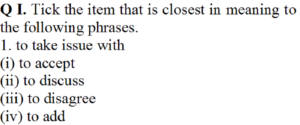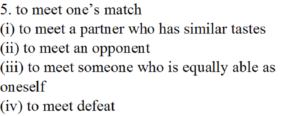English CBSE Class 11 NCERT Hornbill Chapter 7 The Adventure Free Solution of Textbook Questions and Answers
THE ADVENTURE
(Textbook Questions)
Understanding the text


Answer: False


Answer: True


Answer: False


Answer: False


Answer: True


Answer: Rajendra had clarified that Professor Gaitonde was physically in the present world only. But his thoughts had travelled to the world of different time. So he was experiencing the events of different time.


Answer: Rjanedra had clarified to Professor Gaintonde that he had gone through a unique set of feelings. This experience has come after his collision with a truck. Professor Gaitonde had experienced a different world while being in this world.


Answer: The present day of India had accepted the power of British. Indians were following their culture and obeying their orders. But the India of previous day seen by Gaitonde was different. Peshwas were powerful and British had to accept their authority.


Answer: Rajendra was trying to explain movements of electrons as per the quantum theory. He was trying to equate this to various possible explanations that a world can present. During this discussion Professor Gaitonde remarked that quantum theory also has some limitations. It cannot explain everything.


Answer: Professor Gaitonde had asked why he had made the transition to other word. In reply to this question Rajendra had made this statement. He wanted to express that for a change to occur, there has to be a force to act upon. This force is termed as interaction. In the text this interaction force was provided by the thoughts prevailing in his mind and his collision with truck.
Talking about the text


In support
According to the text, after defeat of Marathas in the Battle of Panipat, the political situation changed in India. After the Battle of Waterloo, the plight of Napoleon changed forever. Advent of Nelson Mandela in South Africa has changed its history for ever.
There are many more instances in the history when one single event has changed history of a nation.
Against
History is built through several incidents woven together for a long time. No single incident has the power to change development of a nation forever.
Atomic bomb had destroyed two cities of Japan. It was a setback. But the country has come out of it successfully. Vitenam war had destroyed economy of the country. But they have overcome the difficulties. Germany was divided into two parts and lot many restrictions were placed after second World War. But now Germany is a powerful country of the world.
Thus one single incident cannot cause an everlasting change. One can build up again from any level.


In support
In order to experience something, it needs to be transmitted through one of the five senses of touch, sight, taste, smell and hearing. Everything that exists in this world is reality. It can be felt only through these sensory glands. All other things are fantasy.
Against
It is incorrect to say that reality can be felt only through senses. Has anyone seen the affection of a mother to child. Has anyone ever seen God, Who has seen the respect towards elders and parents. We understand their existence only by experiencing in our heart.
Thus reality is also beyond what we experience.


In support
Every enquiry or learning goes through the steps of observation, analysis and validation. In history we observe the remains or literature, put things in a logical perspective, analyse, propound a theory and validate it. Discovery of law of gravitation was also based on these aspects. Philosophical theories are also based on observation, validation and logics.
Hence methods of enquiry is same for all subjects.
Against
No two branch of study are identical. Each has its own specialty. The law of gravitation does not apply to love between mother and her child. The law of repulsion does not apply to hate between two communities. The philosophical arguments do not find any support in science.
Thus each branch of study has its own rules of understanding.


Answer: In the story ‘The adventure’ the main character seems to travel to another world. It is narration of present situation with another imaginary situation. The basis of imagination is if a past event had occurred otherwise., we can say that it is a work of fiction.
‘We’re Not Afraid to Die’ is a narration of a real life situation. It is a narration of preparations done by a family for adventure and difficulties faced during the journey. It also narrates how they overcame the situation.
So while one is a work of imagination the other is a real time story.


Answer: Gaitonde had experienced a different version of Battle of Panipat. He also had the experience of being thrown from the presidential chair. Both these aspects were contrary to what he was used to believe.
After being thrown from the dais, he did not have the courage to preside over any other function.
Thinking about language


Answer: Gangadharpant’s mother tongue was probably Marathi and that of Khan Saheb Urdu. These two languages are close to Hindi and take many words from Hindi. Therefore they might have talked in Hindi that had flavor of Urdu and Marathi.
Gangadharpant and receptionist conversed probably in English.


Answer: it is a journal published in Maharashtra. The title of the journal has Marathi flavor. So it was probably written in Marathi.


Answer: The Marathas might have used Marathi, the Mughals Urdu and the Anglo-Indians English.
While conversing with each other the language could have been a mixture of all the three languages.


Answer: The ruler would always impose their own language as the official language of the region. Students would be taught that language from the school level itself. Others would pick up while conducting daily routine.
In due course of time the official language becomes that of the ruler. But the language of communication gets amalgamated with each other.
Working with words


Answer: (iii) to disagree


Answer: (i) to express


Answer: (ii) to be independent


Answer: (ii) to stop operating


Answer: (iv) to meet someone who is equally able as oneself


Answer: The first sentence means that one could easily observe that he was affected.
The second sentence means that his eyesight was damaged.


Answer: There was a green stripe and next to it was a black stripe. All the stripes were drawn in this fashion.
The second sentence means that one could use either green stripes or black stripes.


Answer: The first sentence mean that the team had won two matches.
The second sentence means that the team had played two matches one immediately after the other – probably without any gap between these.


Answer: The first sentence means that the librarian showed respect to the knowledgeable scholar.
The second sentence means that you will find historians in the archeology section of the museum. You will find scientists in the science section of the museum.
****


0 Comments